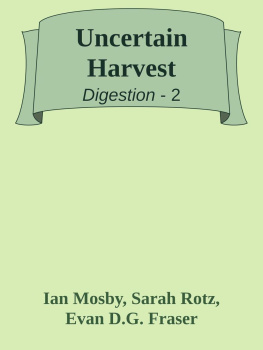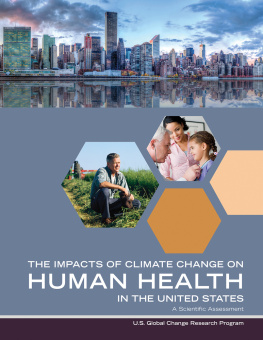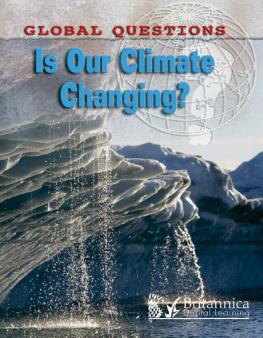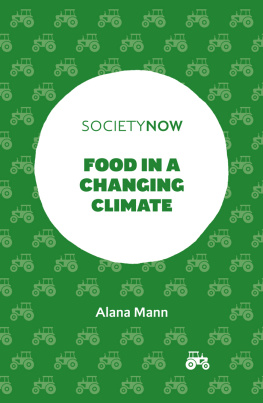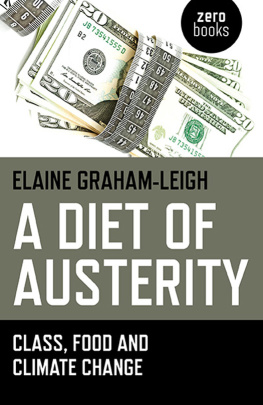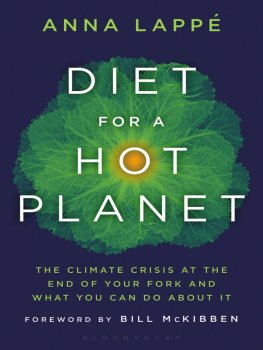DANIELLE L. EISEMAN is a visiting lecturer in the Department of Communication at Cornell University, where she teaches risk communication, science communication and writing, and environmental communication. Danielles research examines climate change communication strategies with a particular focus on encouraging pro-environmental behavior change. She also contributes to interdisciplinary research on policy, planning, and resilience at the community level. Her doctorate is in marketing from Heriot Watt University in Edinburgh, Scotland. Danielle also holds masters degrees in carbon management from the University of Edinburgh and in interdisciplinary studies (marketing and economics) from DePaul University, a bachelors degree in chemistry from Miami University, and a degree in culinary arts from the Scottsdale Culinary Institute.
MICHAEL P. HOFFMANN dedicates all of his time to the grand challenge of climate change and helps people understand and appreciate what is happening through food. Melting glaciers are bad enough, but the loss of coffee is downright terrifying, and this is what keeps him going. He tells the climate change story to a wide range of audiences and has published climate change articles in the popular press: The Hill, Fortune, USA Today, and Medium. His TEDx TalkClimate Change: Its Time to Raise Our Voiceshas been well received. Previous positions he has held include executive director of the Cornell Institute for Climate Change Solutions, director of the Cornell University Agricultural Experiment Station, associate dean of Cornells College of Agriculture and Life Sciences, associate director of Cornell Cooperative Extension, and director of the New York State Integrated Pest Management Program. He is a professor emeritus in the Cornell Department of Entomology. He received his bachelors degree from the University of Wisconsin, a masters degree from the University of Arizona, and a doctorate from the University of California, Davis.
CARRIE KOPLINKA-LOEHR learned to haul hay bales and milk cows as a teenager, then spent three decades communicating about agricultural issues and how they intersect with the environment. At Cornell University she directed the Northeastern Integrated Pest Management Center, which continues to fund multistate research and extension projects that reduce environmental risks. She also developed and led the communications team for the New York State Integrated Pest Management Program in Geneva, New York. As a freelance writer, Carrie has published in YES! magazine, Sierra magazine, and other venues. She lives in a student-designed solar home and is an avid gardener and land conservationist. With a masters degree in science education from Cornell University and a bachelors degree in English from Colgate University, Carrie is a member of the Society of Environmental Journalists and the National Association of Science Writers.
ACKNOWLEDGMENTS
We are deeply indebted to many people for the creation of this book, beginning with the experts who reviewed these pages. They not only saw when we strayed from fact but also noted when we might have strayed from reality. Given the diverse topics in the book, we engaged a wide range of reviewers, from climate scientists to a mixologist. Any errors that remain in the book are ours.
Our reviewers included Rima Al-Azar, Mike Baker, Chris Barrett, Brian Belcher, Gary Bergstrom, Brett Chedzoy, Michael Ciaramella, Jonathan Crane, Karl Czymmek, Art DeGaetano, Sanford Eigenbrode, Ben Faber, Dan Flynn, Brandon Fortenberry, Danny Fox, Tom Gallagher, Grant Gayman, Chris Gerling, Curt Gooch, Alexander Hristov, Jarra Jagne, Pat Johnson, Greg Jones, Kaylyn Kirkpatrick, Glen Koehler, Jordan LeBel, Johannes Lehmann, Karen Lewis, Bruce Linquist, Susan McCouch, Sara McDonald, Asha Miles, John Oliver, Greg Peck, Carlos Prez, Carolyn Peterson, Per Pinstrup-Andersen, Paula Ribeiro Prist, Rick Rhodes, C. Alan Rotz, Earl Rutz, Ernie Shea, Adel Shirmohammadi, Tom Sleight, Timothy Spann, Margaret Smith, Mark Sorrells, Pat Sullivan, Norm Uphoff, Justine Vanden Heuvel, Paul Vossen, David Wolfe, Peter Wright, and Lew Ziska.
We add to this list David Hoffmann and Terry Kristensen, who provided person on the street reviews to help ensure our style and content were appropriate for the intended audience.
Many professionals who contribute to the worlds food supply also agreed to be interviewed for this book. We thank Rima Al-Azar, Shannon Brock, Dan Flynn, Kyle Foley, Jesse Harriott, Jennifer Crist Kohn, Ken Martin, Taylan Morcol, John Oliver, Andres Padilla, Carlos Prez, Pat OToole, Dave Rapaport, Allison Thomson, Tony Turkovich, Steve Train, Krista Tripp, Tom Turini, and Colton Weinstein, all of whom had to come in from the fields or turn their attention from their work to share about their lives and perspectives.
Mike Koplinka-Loehr offered a listening ear and generous heart; Barbara Crooker allowed us to reprint a portion of Ode to Olive Oil; Kathleen Loehr lovingly shared her wisdom; the Lansing Writers Group reviewed two years worth of profiles; and Neel Inamdar described current challenges in US fisheries.
Cornell undergraduate students researched, fact checked, and wrote portions of some chapters. Maeve Anderson prepared drafts of the rice and chocolate topics, and Kalena Bonnier-Cirone drafted the vanilla and potatoes topics. Nancy Engel explored several topics early on.
We are grateful for the remarkable artwork of Lindsey Potoff (Cornell 22), who could take a boring bar graph and depict it visually for all to easily grasp. Her creativity was an enormous help in telling the changing menu story.
Kitty Liu, editorial director for Comstock Publishing at Cornell University Press, gave detailed editorial advice and responses to inquiries from the day we started discussing the book to the final days of going to press. Likewise, Alexis Siemon, acquisitions assistant and Mellon University Press Diversity Fellow at Cornell University Press, was exceptionally helpful.
Alison Fromme edited early drafts of several chapters. Kathleen Kearns, The Book Coach, read every word. She offered insights into the organization and structure of the story, checked for editorial compliance, and helped establish a consistent writing style. Her contributions were immensely helpful. She was an outstanding coach.
Cornell Universitys 2019 Podell Emeriti Award for Research and Scholarship and the Toward Sustainability Foundation provided critical financial support for the research, writing, and editing of Our Changing Menu.
Thank you.
Our Food Supply
From Land and Sea to the Menu
In todays globally interconnected food system, many people are privileged enough to dine on food from hundreds of locales around the world, whether its fresh kiwis from Peru, mangoes from Mexico, saffron from Iran, or wine from Italy. An extraordinary systemfarms, facilities for transport, storage, and processing, and wholesale and retail suppliershelps ensure that many who live in the United States or other rich countries have a full menu of foods and drinks from which to choose.
The food you eat has often traveled great distances and gone through a number of processes before it reaches your table. As you sit down to quiet your growling stomach with a pasta dish, pizza, or a chicken casserole, you likely will not know from where the many ingredients came. The farmer in Kansas who harvests the wheat for your sandwich bread, the families on small farms in Costa Rica who pick the beans for the coffee you savor, and the Tanzanian farmer growing sesame for the oil in your salad dressing are all part of this amazing global food system.
Not all food is from distant places. In 2012, about 8% of US farms were marketing their products locally.


